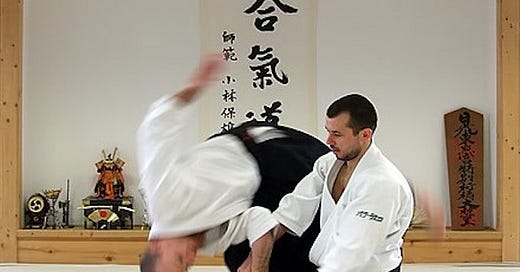Respect is a Two Way Street; Self Care, Part 2: Your Spiritual Practice; and a Moonset.
3 Pillars Parent Newsletter #45
By: Catherine Lynch and Glenn Collins
Dear Awesome Parents,
It’s January, and it’s predictably cold here on the East Coast of the US. We’ve spent more time inside writing this week, and less time outside in the cold, damp North Wind. Therefore, you get 2 articles this week: Respect is a two-way street and Self Care, Part 2: Your Spiritual Practice.
“Where do we come from? Where do we go? Why are we here? What’s life for?”
These big questions didn’t just arise recently - people have been asking deep questions like these for a long time.
There seems to be an innate drive to ponder such questions, and we’ve come up with many different answers over the the course of our history. Regardless of the answer, practices such as prayer, meditation, and contemplation seem to be universal.
For many, spiritual practices help them cope with the uncertainty, stresses and disappointments of life, and provide a source of inspiration, comfort, and joy. (Which is why we’re talking about it right now during our month of self-care.) Because - you may have noticed - when you’re stressed, your kids are stressed. When you need some soothing, chances are they do too.
As children are soothed when they feel securely connected to their parents, we parents can feel soothed when we feel connected to something larger than ourselves - when we feel that we are not small and alone.
Food for Thought
What are your current practices that help you feel connected to something larger than yourself? That are soothing? That help you cope with life’s stressful moments?
If you were raised with spiritual practices, do they still serve you? How have your practices changed from when you were young?
There are lots of practices that help us feel part of the bigger picture, part of the “all there is”. For many people, organized religion serves that purpose. Others find joy and solace in individual practices that help them re-connect to themselves, to others, or to something greater than themselves. Here’s just a few of the many activities people have used to soothe themselves, feel one-ness, and re-connect to that-which-is-greater, or whatever you choose to call it.
Meditation. Prayer. Song. Dance. Music. Journaling. Yoga. Gazing at the stars. Moments of quiet reflection. Swimming in a natural body of water. Reading mystical poetry. Mountain climbing. Sitting in the woods by yourself. Companionship around a fire. Sharing a meal with loved ones.
Home Practice:
Has your practice gotten stale? Are you out of the habit, or do you need to freshen it up a bit? If so, try something new this week - or something you’ve tried before and didn’t stick with. Drop us a note and tell us what you tried, and how well it worked.
And remember this: When we take good care of ourselves, we’re also taking good care of our kids.
Respect: It’s a two-way street.
“I never had a physical altercation in all my years of being a police officer.” This is what my friend, a retired state trooper, told me.
We met at the Aikido dojo where I trained. He had studied other martial arts and the subject naturally came up as to whether he’d ever had to use any of his martial training for real as a police officer.
While I knew that the Hollywood portrayal of policing with its emphasis on car chases, shootouts, and struggles isn’t how policing is in the real world works, I was still surprised that he’d never had to use physical force.
When I asked why he thought this was, he replied without hesitation, that it all came down to respect. He said he always treated the people with respect. Even if he was going to arrest someone he treated them with respect. He would tell them he was going to arrest them, tell them why, tell them what he was going to do, and what he expected them to do. There was never a problem.
He was so good at de-escalating situations that he became his barrack’s go-to person to send to domestic disturbance calls. If you know anything about policing, you know that domestic disturbances are some of the most tense, unpredictable, and dangerous calls officers go on.
Again, his secret was respect. When he arrived at a domestic dispute, the main thing both parties wanted was to be heard. To have someone they could talk to that would listen to them. By treating everyone with respect and giving them an opportunity to talk - and be heard - he was able to calm everyone down and resolve the situations without violence.
At this point, you might be wondering why we’re talking about policing in a parenting newsletter. Well, respect is an important element in all relationships. In fact, it’s impossible to have a good personal relationship with another person without mutual respect. There isn’t a parent we’ve talked to who doesn’t want to be respected by their kids. And every kid craves respect from their parents as well.
There are different types of respect:
Power: Respect based on the other person’s ability to negatively affect our lives whether we want them to or not.
Position: Respect based on the other person’s position. Teacher. Elder. Coach. Police officer.
The Golden Rule: Basic human to human respect. We treat other people respectfully, just like we would like to be treated respectfully by them.
Admiration: Respect based on our genuine admiration for the other person’s character or achievements.
The first two types of respect were certainly present with my friend in his position as a police officer. The people he interacted with knew he had power. That he could ticket, arrest, or otherwise make their life difficult. And in the case of a physical confrontation, he had broad latitude in his right to use force - up to and including deadly force. But that’s not the kind of respect he was talking about. And not the kind he relied on. He used basic human to human respect.
He talked to people. He listened to them. There was no question that he was going to do what he needed to do, but as much as possible he respected people’s dignity. Their desire to be talked to, not at. Their desire to be heard. Their desire to be treated like a human being. And his respect was reciprocated. Him treating them with respect resulted in them treating him with respect. That’s what he believed kept his interactions from escalating to violence.
The same type of respect that my friend used so effectively as a police officer works with kids too. But this kind of respect is a two-way street. To get respect you give respect. You’re the leader of your family. You set the example. You set the tone. If respect doesn’t start with you, then where?
We can hear the objections:
I’m the parent, I deserve my kids’ respect, I brought them into this world. I support them, I feed them, I put a roof over their heads, I buy all their stuff.
Respect has to be earned. My kids must demonstrate by their actions that they deserve my respect.
If my kids don’t respect me (i.e. fear me), they won’t listen to or obey me.
While there’s certainly an element of truth to these objections, these are also true:
You are your kids’ primary role model. How you interact with them creates the template for how they’ll treat others - and how they’ll expect others to treat them. If you respect them, they’re more likely to respect others. If you don’t respect them, they’ll think that’s normal and they’ll accept that behavior from people around them. Do you want your daughters to think it’s normal for men to treat them disrespectfully? Do you want your sons to accept disrespect as a normal part of their relationships?
Relationships tend to be reciprocal. If you don’t treat your kids with respect, eventually they won’t respect you, either. Or they’ll only respect your ability to punish them, and if that’s the case, they won’t want to spend time with you.
Kids tend to live up, or down, to your expectations. If you don’t trust and respect them, it shouldn’t surprise you when they don’t act trustworthy or in ways that you can respect.
So what does this look like in real life as a parent? What are some ways to show your kid respect?
Priorities: Your kid is an independent being who has their own needs, wants, and priorities. You don’t have to agree with them, but acknowledging that their priorities are as important to them as yours are to you shows respect.
Ask. Don’t Order: This isn’t always possible, but when you can, rely on asking them to do things instead of simply ordering them to. No one likes to be ordered around. The older your kids are, the more this applies.
Agency/Decisions: When feasible, let them make decisions about things that are important to them in their lives.
Capabilities: Your kids are more capable than you know. Give them opportunities to demonstrate it.
Ideas and Opinions: Your kid has a rich inner world. They’re full of ideas. Talk to them and listen to what they have to say.
Parental Authority: Like my friend who got respect from the power and authority of his position as a police officer, there’s no question that respect for your authority as the parent has to be part of the equation. Particularly when your kids are young. There will be times (lots of times!) where it boils down to you saying essentially: “Do it because I said so.” “Get in the car.” “Put the phone down.” But you can say those things with respect. Without trampling all over their feelings. Without making them feel bad about themselves.
You can be respectful to your kids without agreeing with their actions or words.
You can talk to them respectfully.
You can hold them accountable while being respectful. You can even discipline them with respect.
What does respect sound like?
You use the word “Please”.
For example, “Please put your phone away now.”
You talk about their behavior, not their character.
“It’s wrong to do that.”
Not “You’re so weak for doing that.”
You demonstrate understanding.
For example, “I understand why you did that. You were really frustrated. But it’s not ok to do that when you’re mad.”
You show empathy.
For example, “I get it. I’d be really mad too if that happened to me.
You give agency.
For example, “You can choose when/how many/what kind/which one/how much….
Home practice/Questions to ponder:
Which kind of respect do your kids have for you - Power, Position, Golden Rule, or Admiration? What kind do you want?
Recall a recurring conflict you’ve had with your kids and decide on one small way you can show more respect next time it happens.
If you’re feeling extra brave, write the word Respect on a post-it note on your fridge and be ready to talk about it if anyone asks.








